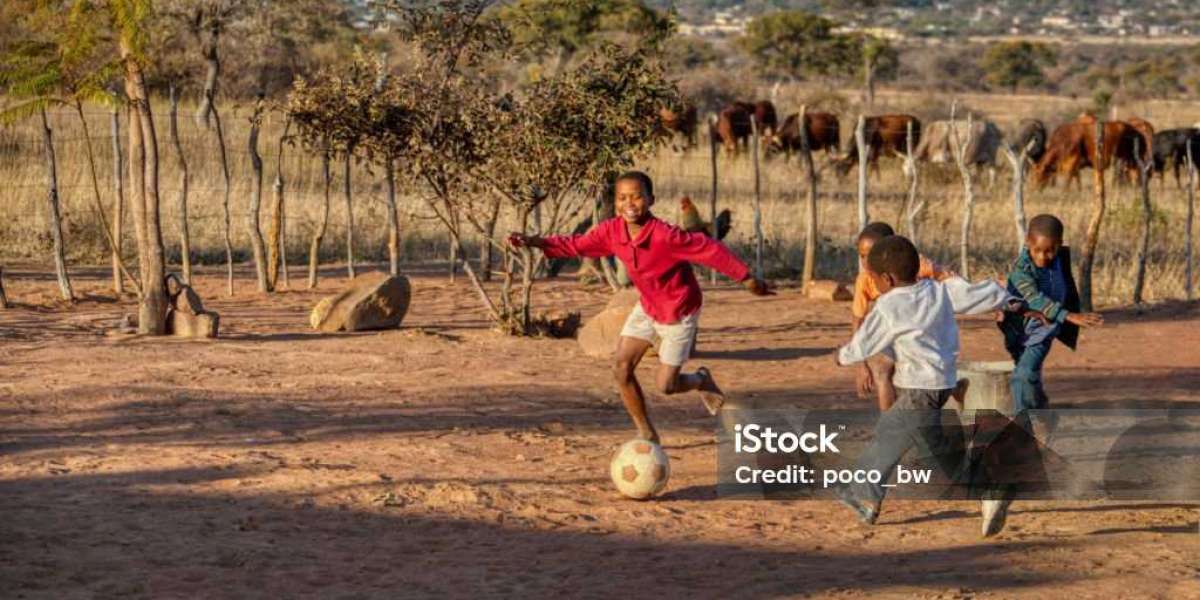I was just a boy from the heart of Kenya, born and raised under the scorching sun, where dusty fields and open skies became my playground. My earliest memories are etched with the joy of chasing after a worn-out football with bare feet, my laughter mingling with that of my friends as we played until twilight. We didn’t have much in terms of material possessions, but I had a ball, a dream that burned bright, and a mother who, against all odds, believed in me with every fiber of her being.
Growing up, football wasn’t just a game; it was everything. It was my sanctuary, my release, and my most profound teacher. When the world outside felt overwhelming, the pitch was my escape. It was where I processed emotions, where my anxieties dissipated with every kick of the ball. It was a therapy session conducted through sweat and exhilaration. More than that, football taught me invaluable lessons: resilience in the face of defeat, the importance of teamwork when striving for a common goal, and the sheer joy of pushing your limits. In the structured environment of a school, sports teach values that textbooks, for all their academic merit, often overlook or cannot convey with the same visceral impact. On the field, children learn about grit when they push through exhaustion, about humility when they lose, and about collaboration when they must rely on their teammates. They learn to communicate, to strategize, to adapt. These are not merely athletic skills; they are life skills, crucial for navigating the complexities of adulthood.
In primary school, I was that kid who lived for games time. Break time, lunchtime, after class—any moment I could snatch, I was out there, immersed in the beautiful game. My classmates cheered me on, their shouts of encouragement echoing across the dusty grounds. Teachers often smiled, perhaps amused by my unwavering dedication, but they never really asked how far I wanted to take it. There were no scouts lurking on the sidelines, no structured training programs designed to hone nascent talent, no established platform to guide aspiring young athletes. In the eyes of the educational system and wider society, football remained just a hobby, a playful diversion, never a viable path.
Secondary school didn’t offer much different. The fire in my feet and the passion in my heart still burned fiercely. I continued to play with the same intensity, dreaming of grander stages. Yet, slowly, insidiously, reality began to whisper its harsh truths in my ears. The insidious murmurs grew louder: “There’s no future in this,” “You need a real career,” “No one makes it from here.” These were not just external voices; they became internal echoes, chipping away at my resolve. Slowly, painfully, I began to believe them. The system, once again, offered no structured school programs, no dedicated mentorship, no one who could stand before us and declare, “I made it, and you can too.” Football, once a vivid, undeniable presence in my life, began to fade into the shadows of my textbooks, replaced by the weight of societal expectations and the perceived need for a "practical" future.
When I eventually joined college, the full weight of that realization hit me with the force of a physical blow. I wasn't going to be a professional footballer—not because I lacked the talent, the skill, or the dedication, but because I lacked the fundamental support system. The infrastructure simply wasn't there. The system didn’t nurture raw potential; it overlooked it. Society, it seemed, only celebrated sports if you were already a household name, an established star. And yet, even amidst that profound sense of loss, I gained something else, something invaluable: perspective. The disappointment, though sharp, opened my eyes to a bigger picture, a broader mission.
I am now a teacher in training, standing on the cusp of shaping young minds. And I have made a solemn vow: no student under my care will ever feel what I felt—that their dream is impossible, that their passion is invalid. I know firsthand, from the depths of my own experience, how profoundly important sports are—not just for physical fitness and the obvious health benefits, but for building character, instilling discipline, fostering invaluable teamwork skills, cultivating leadership qualities, and nurturing unshakeable self-confidence. Beyond the school gates, in the heart of communities, football and other sports possess an almost magical ability to bring people together. They transcend tribal lines, dissolve social barriers, and offer young people a powerful sense of purpose and belonging. In a world often fragmented by differences, a shared love for a game can forge bonds that last a lifetime, fostering unity and understanding. It provides a healthy outlet for youthful energy, diverting it from potentially destructive paths and channeling it into something constructive and empowering. It offers a tangible reward for hard work, a sense of achievement that can be elusive in other areas of life for many disadvantaged youth.
I firmly believe that schools in Kenya, with their inherent reach and existing infrastructure, can be powerful hubs of sports development. They are not merely places for academic instruction but fertile ground for nurturing holistic growth. As a future teacher, I plan to be an active agent of this change. My vision is clear, actionable, and rooted in my own journey: to organize structured football clubs in school, not just for fun, though enjoyment will always be central, but with clear training programs, designed to develop skills, tactical understanding, and physical conditioning. Crucially, they will incorporate dedicated mentorship, providing guidance not just on the field but in life. This means coaches who are invested in the personal growth of each child, who see beyond the immediate game. I also plan to advocate for robust school sports days and interschool tournaments, as these events are more than just competitions; they are vital showcases where talent can be identified, scouted, and nurtured. Imagine a system where scouts from regional academies or even national programs regularly attend these events, offering pathways that were once unimaginable for children like me. This requires collaboration between schools, local sports organizations, and even government bodies to create a cohesive scouting network. Furthermore, I will incorporate sports principles directly into lessons, as the lessons learned on the pitch are transferable to the classroom and to life. I plan to use games and sports analogies to teach discipline, time management – like understanding the importance of punctuality for practice, managing time between studies and training, and mental well-being like coping with pressure, bouncing back from setbacks, the power of positive self-talk. This interdisciplinary approach can make learning more engaging and relevant. I'll also strive to bring professionals and alumni back to mentor students. There’s immense power in seeing real-life examples of success. Inviting former athletes, coaches, or even professionals who have leveraged their sporting backgrounds into successful careers, to speak to and mentor students, can be profoundly inspiring. They can share their journeys, offer practical advice, and demonstrate that a passion for sports can indeed open doors, even if not directly to a professional playing career. These mentors can be role models, proving that "making it" comes in many forms. And finally, I will actively support both boys and girls in sports, ensuring equal access and encouragement. Talent knows no gender. It’s imperative that girls have the same opportunities, resources, and encouragement as boys to pursue their sporting dreams. This means investing in girls' teams, providing female coaches and role models, and actively challenging societal biases that might discourage girls from participating fully in sports. Equal access to facilities, equipment, and training is non-negotiable.
What drives me most in this endeavor is the profound belief that those who were supported ought to support others. I was incredibly lucky to receive a university scholarship, a lifeline that allowed me to pursue higher education. I know, with absolute certainty, that it was someone’s generosity, someone who believed deeply in the transformative power of giving back. That act of kindness inspired me to my core. It wasn't just about financial aid; it was about someone seeing potential in me, someone investing in my future. I want to be that someone for the next child with a dream. Maybe a quiet boy with quick feet, just like I was, who feels the world doesn’t see his talent. Or perhaps a quiet girl with a fierce strike, who is told sports aren't for her. If I can light that fire in them, if I can show them a pathway, if I can give them the tools and the belief to pursue their passion, then I’ll have done my part. It’s a way of extending the ripple effect of generosity that I was fortunate enough to experience. It’s about creating a chain reaction of hope and opportunity.
Much of who I am today, the resilience I possess, the empathy I feel, and the vision I now champion, is because of one extraordinary woman: my mother. She raised me single-handedly, with a strength and sacrifice that I can never fully repay. I witnessed her daily struggle, her unwavering determination. She worked long, arduous hours, often denying herself even basic comforts, just to ensure I had books for school, shoes on my feet, and, occasionally, the much-coveted football boots that felt like treasures. She fought off the judgment of a society that often stigmatizes single mothers, bore the immense emotional exhaustion and loneliness that come with such a demanding role, and still managed to be my loudest, most enthusiastic cheerleader, even when others saw only a boy wasting time on a dusty field. Her challenges were many—persistent financial struggles, the emotional toll of carrying such a heavy burden alone, and the pervasive societal bias she faced. But her triumphs, in retrospect, were infinitely greater. She didn't just raise a child; she raised a resilient, compassionate human being. I am her triumph, a living testament to her extraordinary love and sacrifice.
To every single mother reading this, whether you are in Kenya or anywhere else in the world: your child sees you. Your child carries your sacrifices, your strength, and your unwavering love into their dreams. Every late night, every early morning, every whispered prayer, every selfless act—it all registers, it all counts. You are building foundations of greatness, even when you feel unseen or unheard. And to every boy or girl who loves football, or any sport, and feels unseen, unheard, or that your passion is dismissed: know that your dream is valid. It is real. You are not alone in feeling this way. And maybe, just maybe, someone like me will meet you in school—a teacher who understands, a mentor who believes—and will remind you that the ball in your hand, the passion in your heart, can still change your life. It can open doors you never imagined, build character that will serve you well, and connect you with a community that shares your love for the game.
From a boy who loved the game, and still does.
— A Future Teacher, A Forever Footballer








